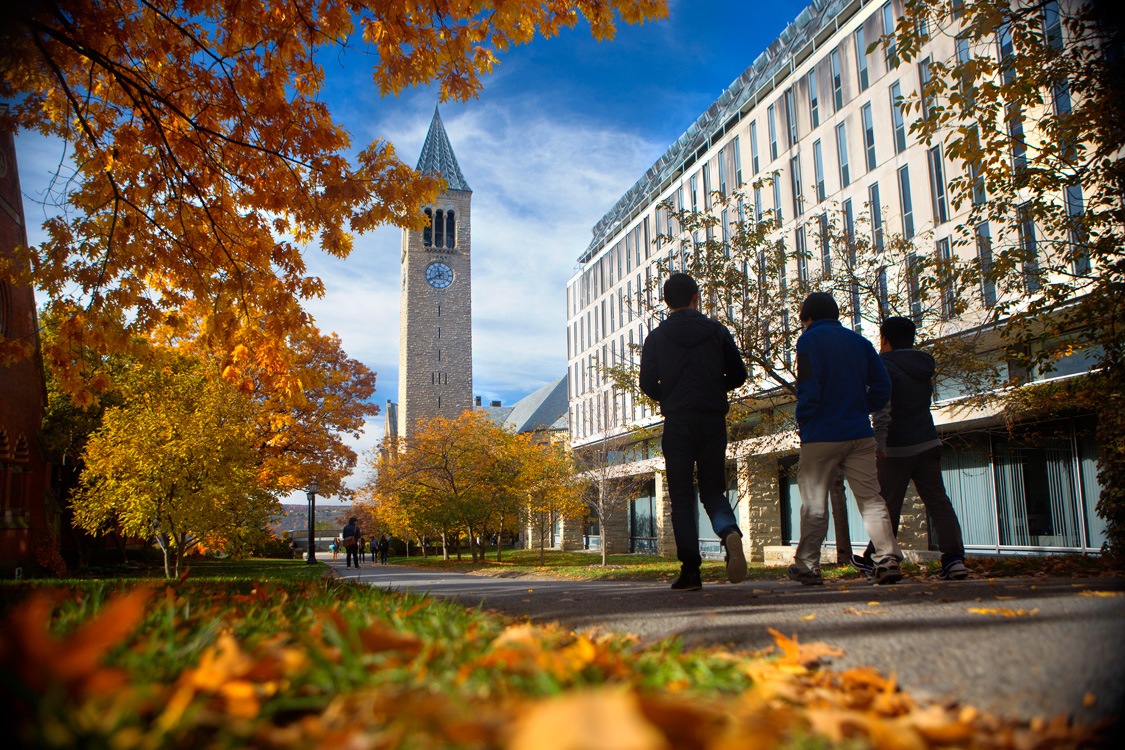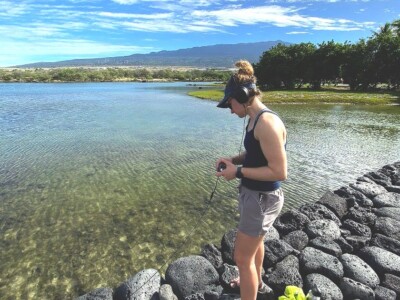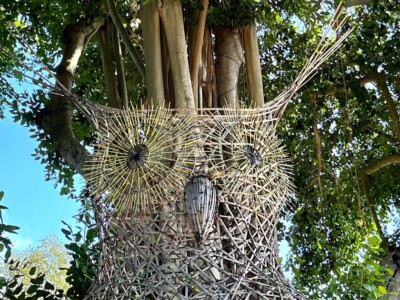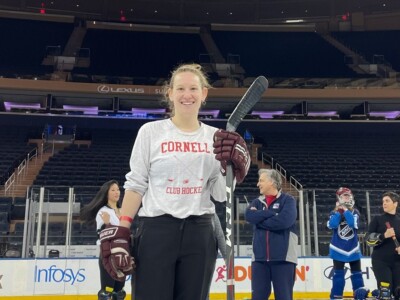When students returned to campus this fall, they were looking forward to their classes—and to the full range of events and activities that make Cornell Cornell. From beekeeping to roller skating to rowing on the lake, students were excited to come back together for their favorite extracurriculars.
For many groups, fall 2021 is the first time they have been able to meet in-person in more than a year. As Cornell athletes return to practices and competitions, and Big Red fans return to cheer on their teams, these in-person experiences are at the heart of students’ college careers.
Across Cornell’s campuses, our students have demonstrated their ongoing commitment to protecting public health as they’ve adapted to changing circumstances. Here, we share how some groups on campus are keeping their members safe, as they get together, build community, and have fun doing the things they love.
We hope you enjoy hearing from student leaders in Cornell Quad Squad, Cornell Rowing, Magic Society at Cornell, CU Cyphers, Pandora Dance Troupe, Big Red Marching Band, Bee Club, and Cornell Origins Urban Life Development, as they share their extracurricular stories.
Cornell Quad Squad
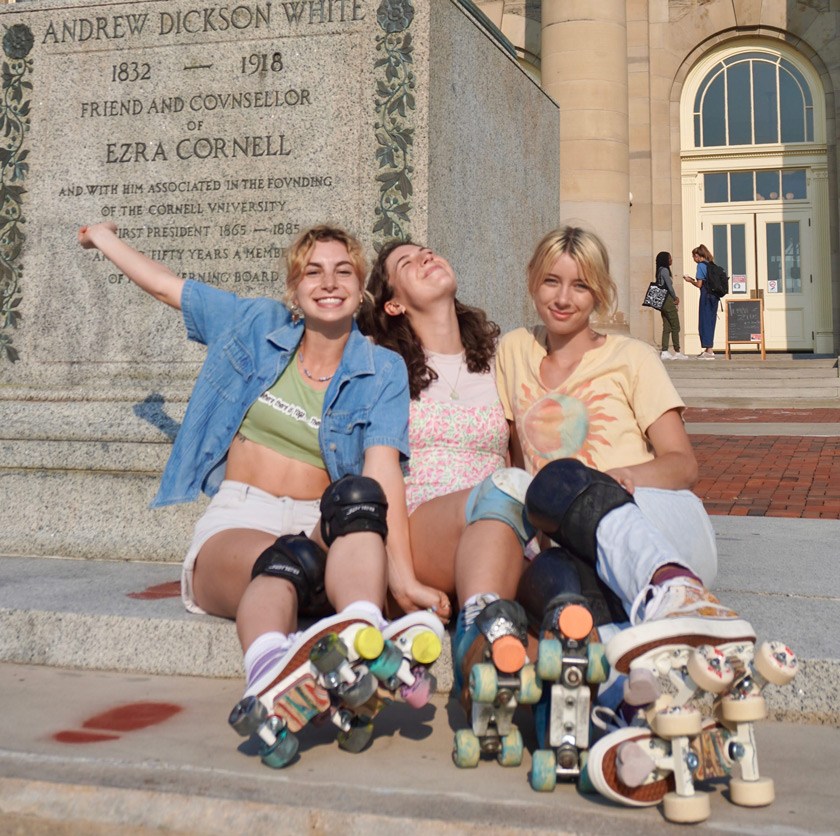
Clara Matton ’22 bought her first pair of roller skates in spring 2020, soon after Cornell transitioned to online instruction. “I’ve hardly taken a day off my skates since,” she says. After watching Clara roll around a parking lot on Facetime, Nina Oleynikov ’22 was inspired to join in the fun.
The pair spent the remainder of the spring and summer of 2020 learning how to skate in their hometowns, eagerly awaiting the chance to skate together when they returned to campus in fall 2020. “Our return to Ithaca for fall semester was full of excitement,” Clara says. “We started scouting out places to skate on Cornell’s campus, and immediately started meeting other roller skaters.” They soon decided to found a new club on campus—which they named Cornell Quad Squad.
Enjoy this short clip of Clara Matton ’22, Nina Oleynikov ’22, and Ann Maris Walton ’22 skating on the Arts Quad.
Their goal is to “spread the stoke of roller skating” on campus and build an inclusive and welcoming community of skaters, Clara explains. The club provides weekly opportunities for connecting through skating. “Through GroupMe, we coordinate roller skating activities, from roller discos to mini-ramp sessions with skateboarders,” she says.
The group can’t reserve sidewalks or parking lots on which to skate, so they decide where to go based on pedestrian traffic, choosing among the many bike paths, athletic courts, and skate parks in the Ithaca area. When the weather makes outdoor skating difficult, members attend parking garage roller discos with skaters in the Ithaca community and take day trips to Syracuse or Rochester to visit indoor skateparks, ramps and rinks, and Bruised Brigade, a favorite roller skate shop.
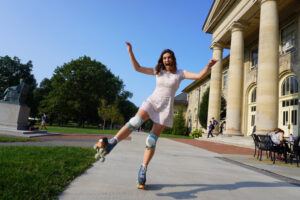
In spring 2021, Quad Squad members joined the Cornell Skateboarding Club for the first skate on the wooden ramp they built at the Watermargin Coop (adjacent to West Campus). “There were skateboarders and roller skaters of a huge variety of skill levels and identities,” Clara says. “As the sun went down, some of the skaters set up a projector and we got to watch ‘Daily Check,’ a film by Marty Cain, a PhD candidate at Cornell, highlighting local skaters and skate spots.”
More than 20 new members—ranging from brand new to more experienced skaters—have joined Cornell Quad Squad in fall 2021. Quad Squad leaders, Clara, Nina, and Ann Maris Walton ’22, host workshops for new skaters to share knowledge, build skills, and foster community. “Our goal is to promote physical and mental wellness and sustain a safe space for skaters,” says Clara.
Most members are undergraduates, but the club welcomes anyone who loves to skate. “If any faculty, staff, or grad students are interested in skating, but don’t feel comfortable starting alone,” Clara says, “our doors are wide open.”
Cornell Rowing: Men’s Lightweight Team
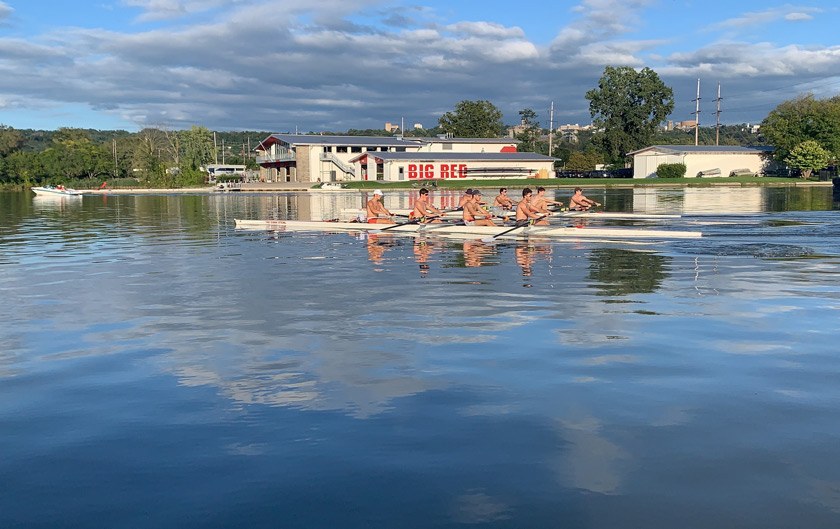
After a year of practicing on their own, rowing team members describe the return to in-person practice this fall as exhilarating.
There are currently 34 rowers and five coxswains on the team. Practices are held eight times a week and include land-based conditioning and rowing on the water. The season officially kicked off on October 2, with the Schwartz Cup, a Cornell tradition for more than 100 years and a very competitive race. A full slate of fall and spring races follows, from the Head of the Charles on October 24 to the IRA National Championship in June 2022.
A few senior members of the team have returned to row and to coach newer team members this fall. Their coach, Chris Kerber, Henry E. Bartels ’48 Head Coach of Men’s Lightweight Rowing, says that although it may sound clichéd, “We do stand on the shoulders of our alumni.”
Watch this short clip of the entire squad practicing in the Rowing Center’s Storage Barn.
“My heart breaks for the members of my class who graduated last year and lost most of their racing career with Cornell,” says Evan Krum ’21, who is wrapping up his final semester at Cornell this fall. “I and my teammates look to shoulder the burden of their hopes and move forward. We would like to impart the lessons of resilience and dogged determination that they left behind to the underclassmen, as we seek to cement our place this year and in years to come,” he adds.
James Cashen ’21, a four-year coxswain who returned this fall to coach his teammates, says, “I am proud of my class for keeping the team close during the height of COVID when all racing was cancelled.” He enjoys sharing the wealth of knowledge he gained during his rowing career with the team. “From how we clean our boats after each row, to creating a successful race day structure for rowers, there is a lot of information for our new coxswains to synthesize,” he explains.
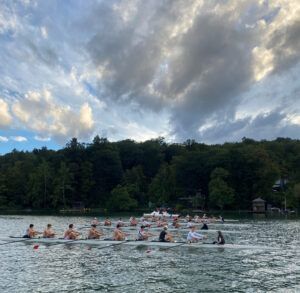
The team recently posted this photo of four boats on Instagram. Team alum Matt Prince ’21 saw the photo and commented “Miss this.” “Matt’s words reflect how impactful the student athlete experience is here at Cornell,” says Coach Kerber.
Drew Hickey ’21 and Evan Krum ’21 were part of the team that won the IRA National Championship in their sophomore year at Cornell, a win that Drew describes as “the highlight of my rowing career.” He says that he learned the art of being a successful student athlete from his peers. “I was able to learn study skills, race day best practices, and recovery techniques when I was an underclassman,” Drew says. “Now, I’m trying to use what little time I have left at Cornell to impart these skills to the next generation of our team.”
Magic Society at Cornell
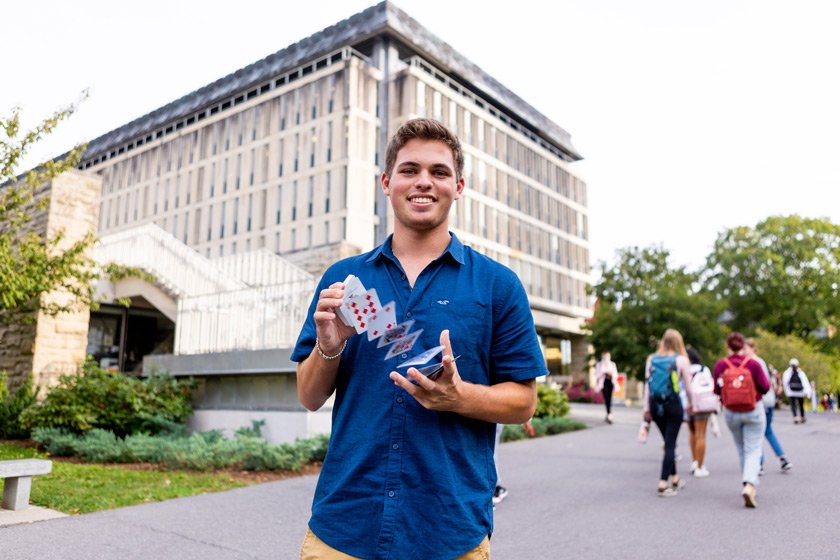
David Frank ’24, founder and president of the Magic Society at Cornell, started performing professionally at the age of 12. As a child, David was inspired by a magic trick his grandfather showed him. He practiced by watching YouTube videos, and soon expanded his training to include books, talks by professional magicians, and networking with friends. He now performs magic professionally at three New York restaurants, as well as at private and corporate events.
David founded the Magic Society in spring 2021, as a way to connect with other Cornellians who are passionate about the art of magic. The club has about 40 members of all skill levels, who come together for monthly meetings to share and practice sleight-of-hand techniques, close-up magic, magic theory, and performance skills. Club members also attend local and virtual magic performances, lectures, and workshops with professional magicians, and they host informal performances on the Cornell campus.
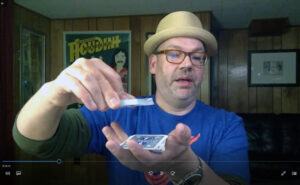
One silver lining during the pandemic has been increased access to top-tier magicians, who have been willing to Zoom in and share their knowledge with group members. “Last semester we worked with magicians such as Michael Carbonaro, Derek Hughes, and Harrison Greenbaum—all of whom I have truly looked up to for quite a while,” David says. “It was a special experience to be able to connect with these magicians and to learn from them,” he adds.
David especially enjoys performing magic in close proximity to his audience, and he focuses on sharing these skills with club members. “While many of my spectators have seen magic in other settings (large auditoriums, television, etc.), they have not had it performed specifically for them,” he explains.
Enjoy this short clip of David Frank ’24 performing impromptu magic in front of Uris Library at Cornell. Credit: Sreang “C” Hok/Cornell University
David loves the connections he makes and the reactions his magic provokes. “There is just something so special about approaching a group of complete strangers with nothing but a smile and a deck of cards, and within minutes have them laughing, gasping, and screaming with excitement.”
David has also spearheaded the creation of an intercollegiate community of magician hobbyists from the Magic Society at Cornell and the Society of Harvard Undergraduate Magicians. The two groups have co-sponsored social events, joint lectures, and performances. The plan is to expand this community to include students at other universities, as well. “Being able to form relationships with people who share my passion for magic has been truly fantastic,” David says.
CU Cyphers
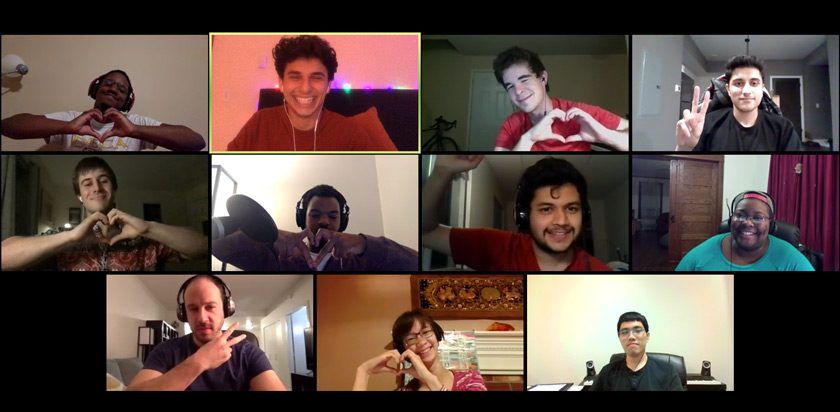
CU Cyphers has been meeting on Friday evenings in Morrill Hall for more than eight years now, and longtime member Marissa Rice PhD ’21, who joined the group in 2016, is among the core group of members who keeps the energy flowing. Marissa, who is now a postdoctoral fellow in Human Development, reflects back on herself: “I couldn’t even do this in 2016. I couldn’t rap on beat, and I couldn’t think of multiple rhymes in a row,” she says, adding, “It’s just cool to watch people get more confidence. We hype each other up like that and it’s really fun.”
Group members practice freestyle rapping over hip-hop beats. They perform their original songs live and help new members learn to create music, use samples, and practice their craft at the weekly meetings.
Enjoy this short clip of CU Cyphers members practicing at their weekly meeting on October 1, 2021 in Morrill Hall at Cornell.
During the pandemic, members met once a week online. The virtual format enabled alumni to tune in. Eitan thinks that this has allowed the group to build deeper connections among different classes. “I feel like it’s madethe whole group much more connected. It made our core that much stronger, and I don’t know if we would have done that without COVID,” he says.
When the members returned to in-person meetings in fall 2021, Eitan says it was “kinda wild.” Members met the week before ClubFest, an annual showcase of extracurricular clubs aimed at new students. “The energy was so good, so right,” he says. “We came back with a vengeance with a really excellent performance.”
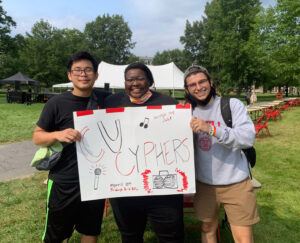
First-year student Jada Mbugua ’25, says that listening to CU Cyphers made her want to join in. “There was something about sampling that I was like, ‘Yo, this sounds so cool, and I want to learn more about it and do more with it.’” Jada says she already feels supported and part of a warm community, which helps to offset her fear of trying something new. “You’re kinda jumping into deep water and it gets scary sometimes. But it was a lot of fun—even if it wasn’t good, we’re all laughing a bunch.”
Helping new members feel comfortable, experiment with finding their voice, and grow as artists is something all the members enjoy about CU Cyphers. “When you’re there helping someone make a breakthrough, and they drop an incredibly hype bar—it’s just so much fun,” says Ian Ghasemian ’23.
Pandora Dance Troupe
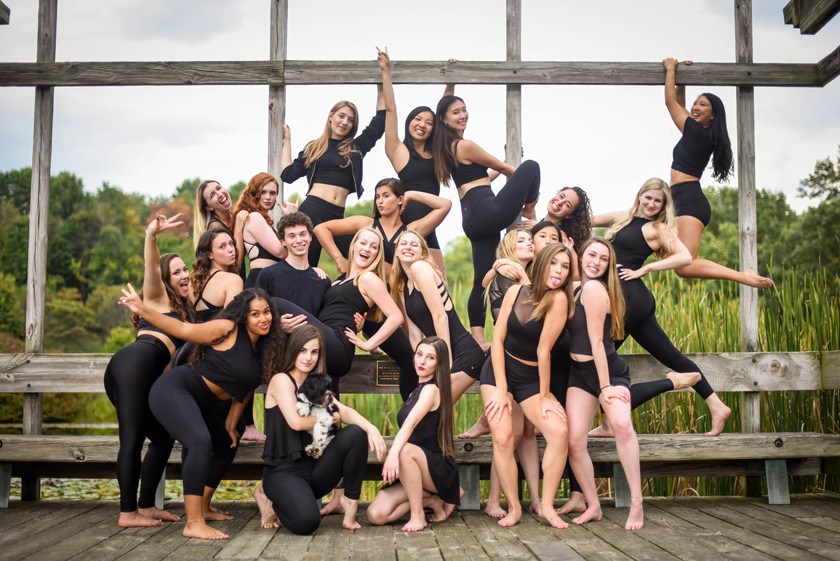
Pandora is a student-led, student-choreographed dance group at Cornell, founded in 2003. Current president, Holly Sullivan ’22, says that troupe members come from a variety of backgrounds, something that makes the group unique. “We’ve had a little bit of everything on our team, from high school dance teams, to ballet dancers, to rhythmic gymnasts, to competition dancers. This gives us a nice level of diversity in styles,” Holly explains.
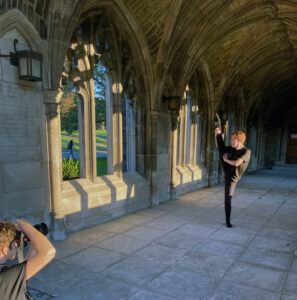
The group currently has 21 members, including nine brand new members who joined this fall. New members recently participated in Pandora’s fall photo shoot. “It was so nice to see them hype each other up and get creative with the poses,” Holly says.
Dancers in the group decide for themselves how much time they want to invest each semester. “Your level of commitment is entirely up to you,” Holly says, “and each individual determines how many dances they can manage.”
Pandora typically produces one show each semester, though dances were shared online last year during the pandemic. In addition to choreographing and performing dances, Pandora members kept their community strong through the pandemic by hosting online events, to paint and play games together via Zoom.
Enjoy “Put It on Me,” produced in spring 2021, choreographed by Angela Liu ’21 and featuring dancers Angela Liu ’21, Holly Sullivan ’22, Iris Zeidner ’24, and Chloe Robinson ’21.
This semester, troupe members are looking forward to performing in person, for a live audience once again. “All dancers must be masked during rehearsals and performances,” Holly explains, adding, “There is always this fear that if the university needed to lock down again, we would never get to showcase our ideas and creativity for an audience.”
In spite of what Holly calls the “ever-looming uncertainty” of the pandemic, Pandora is beginning the process of choreographing and practicing new dances. “Our members put a lot of effort into creating numbers to showcase,” she says. She explains that Pandora alumni stay connected, provide advice to the eBoard, and support the troupe by returning to emcee their shows. “My favorite part of Pandora is the community we’ve created,” Holly says.
Big Red Marching Band
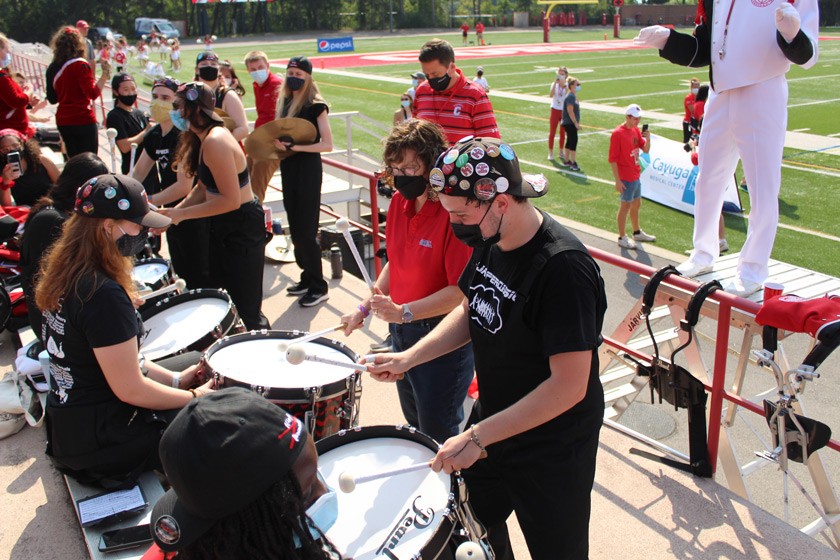
Founded in the 1890s, Big Red Marching Band has been a fixture at Cornell for over 125 years. BRMB hosts concerts around campus and performs on the field during football games. The band currently has 250 active members. Practices are held three times a week, on Schoellkopf Field or at Fischell Band Center.
Big Red Marching Band accepts everyone who auditions. Since fall 2020, BRMB has welcomed about 130 new members, with the majority of these newcomers signing up in fall 2021. Because of this open-door policy, about half of BRMB members are new to marching band and have no prior experience marching or playing.
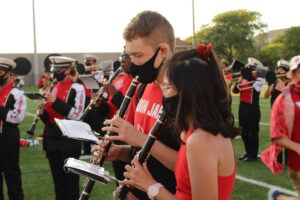
New members are encouraged to try out a variety of instruments at auditions, regardless of whether they have previous experience playing these instruments. “We encourage new members to try out different instruments and choose whatever instrument they’re most interested in,” Carey explains. She reports that many BRMB members end up playing a variety of instruments during their tenure with the band.
Section leaders are responsible for teaching their members the fine points of performing: whether it be playing the flute, clarinet, sax, trumpet, trombone, baritone, tuba, or serving in the BRMB color guard. “Our upperclassmen and section leaders are essential in helping us welcome our new members to the band and teach them how to play and march,” says Carey.
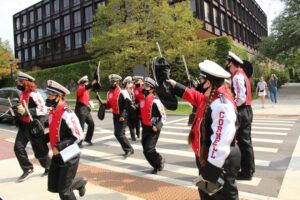
BRMB leaders report that the biggest challenge they face (aside from training their new members) is adapting to “ever-evolving” COVID policies. “This semester we provided each band member with specialized personal protective equipment (PPE), including a face mask designed for playing instruments, as well as bags and covers to shield any holes in the instruments and prevent the spread of respiratory droplets,” says Oliver Matte ’23, BRMB drum major. “All of our events take place outdoors and socially distanced, if possible,” he says, adding, “Despite these precautions, we are so delighted to be back together! I know our band members missed this during the earlier stages of the pandemic.”
During Homecoming weekend, BRMB members got to don new uniforms, which were designed by a student committee before the pandemic. “It was exciting to finally be able to march in them,” Oliver says. “It was so fun to perform for student fans, Class of 2020 graduates, and for a dedicated group of BRMB alumni who came to cheer the band on from the stands!”
Enjoy this clip of the Big Red Marching Band performing on Ho Plaza during Homecoming weekend.
Bee Club at Cornell
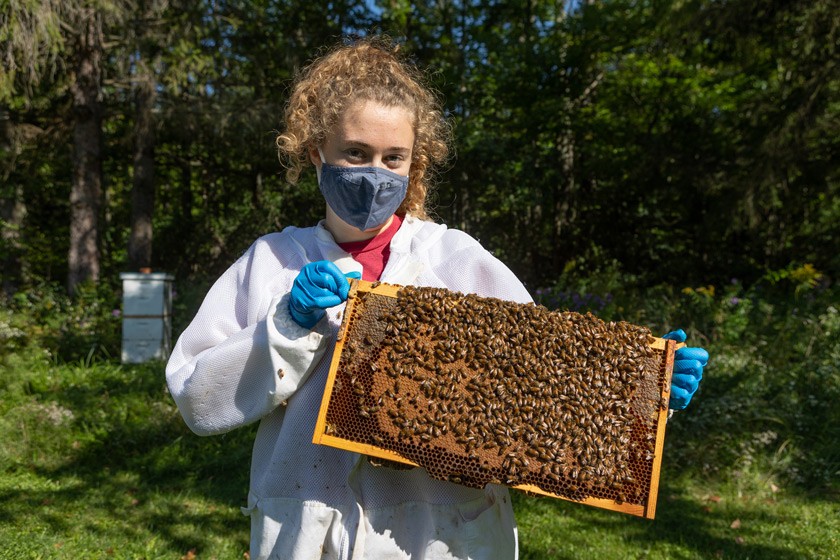
Catherine Crosier says that most Bee Club members have limited experience with beekeeping prior to joining the club. Some watched family or friends tending Honeybees and became interested in learning more about this important pollinator species. “Most of us are intrigued or enamored by Honeybees themselves,” she explains, adding, “They have a general reputation for being cute and quirky.”
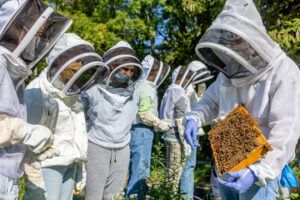
Alexandra Michael ’23, social media chair for the club, shares that she initially joined to work through her fear of bees. “Not only have I overcome my fear,” she says, “but I have gained an appreciation for the important role bees play in sustaining harmony in the environment.” Alexandra says that the experiential aspect of Bee Club is what inspires students to get involved. “There is nothing quite like Bee Club at Cornell,” she explains.
In addition to keeping bees at Dilmun Hill Student Farm, Bee Club hosts educational meetings for students and community members. “Our ultimate goal is to promote sustainable and responsible stewardship of hives and appreciation for all types of bees,” Catherine says.
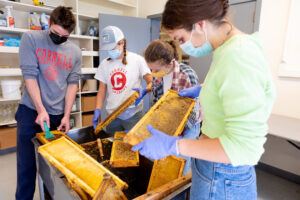
Club members engage in hands-on activities, such as honey extraction and bottling, hive inspections, and candle making. To make up for lost time in the hives due to the pandemic, the club is giving current seniors priority access to in-person activities like honey extraction, which is done in small groups to adhere to pandemic guidelines.
Last year, when it was not possible for students to gather in-person, Bee Club members met virtually. “Seeing everyone come together and share their love for bees gave me hope,” Catherine says. She believes that the dedication of long-time members to keep meeting throughout the pandemic, even when no one was allowed to handle bees in-person, sustained the club.
At Bee Club’s first meeting in fall 2021, more than 60 people turned out, including many first-year students. “I am incredibly grateful for and proud of my fellow club members, or ‘beeple,’ Catherine says. “Like a honeybee hive, we do great things when we work together!”
Cornell Origins Urban Life Development
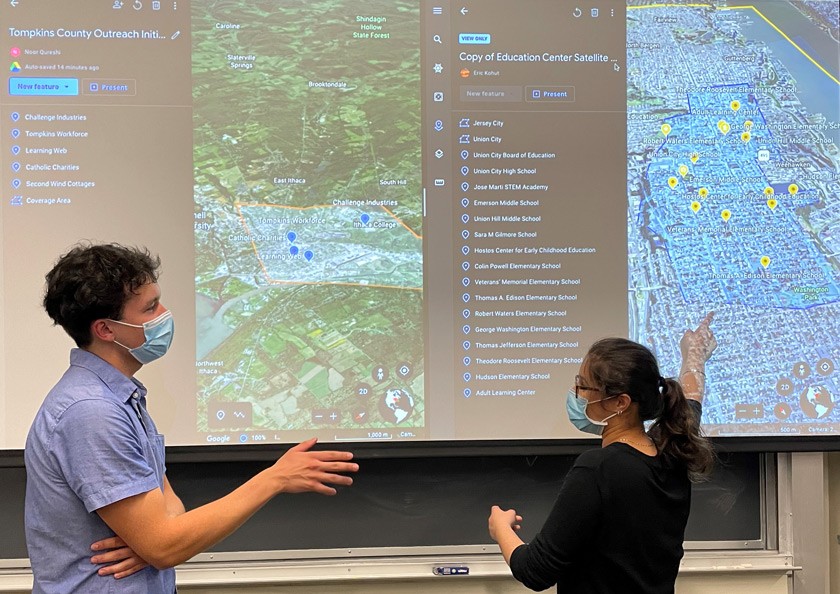
In his second year at Cornell, Eric Kohut ’22 reached out to faculty to see how he could apply the learning and research he was doing at Cornell to projects that serve the community. With a small group of like-minded students and faculty, Eric helped found Cornell Origins Urban Life Development (COULD)—a student-run group on campus that helps students combine their research with community service projects.
The idea is that students can bring Cornell’s knowledge and resources to bear on projects in their hometowns. “COULD enables students to create service projects in areas outside of Cornell,” Eric says. He hopes that COULD will help students from diverse backgrounds develop projects “that support the communities they care about.”
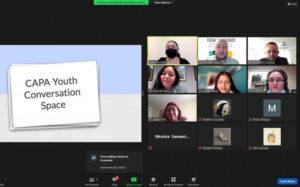
So far, COULD’s members have embarked on three projects in three different communities. Hudson Origin is the brainchild of Eric and COULD vice president Erika Gonzalez ’22. The project provides mental health referral services for youth and their families and caregivers in northern New Jersey. The second project is focused on the local Ithaca community. Respect Ability is a job-search network designed to serve disabled residents of Tompkins County. The third project, the Bronx Health initiative, is still in the planning stages. This team is designing a series of actions to help address high rates of diabetes and obesity and increase access to healthy food for residents of the Bronx, in NYC.
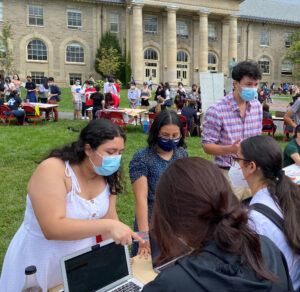
“My favorite part about COULD is that it’s a uniquely people-centered approach to research,” Eric says. “It enables students to learn within the context of care—specifically, care for their communities, families, and friends.”
COULD recently affiliated with Cornell’s David M. Einhorn Center for Community Engagement—a partnership which has opened up a wealth of resources to its members. In response to student demand, COULD is now expanding both its projects and positions. “The fall 2021 semester has been an exciting time for COULD,” Eric says. “A lot of students are excited about translating their Cornell education into service projects. We have hundreds of interested students, and so we’re working to accommodate the large influx who want to participate.”

